| Listing 1 - 10 of 16 | << page >> |
Sort by
|
Book
ISBN: 1283341506 9786613341501 0300165706 9780300165708 9780300165043 0300165048 9780300191981 Year: 2011 Publisher: New Haven, Conn. Yale University Press
Abstract | Keywords | Export | Availability | Bookmark
 Loading...
Loading...Choose an application
- Reference Manager
- EndNote
- RefWorks (Direct export to RefWorks)
The final decade of the old order in imperial Russia was a time of both crisis and possibility, an uncertain time that inspired an often desperate search for meaning. This book explores how journalists and other writers in St. Petersburg described and interpreted the troubled years between the Russian revolutions of 1905 and 1917.Mark Steinberg, distinguished historian of Russia in the late nineteenth and early twentieth centuries, examines the work of writers of all kinds, from anonymous journalists to well-known public intellectuals, from secular liberals to religious conservatives. Though diverse in their perspectives, these urban writers were remarkably consistent in the worries they expressed. They grappled with the impact of technological and material progress on the one hand, and with an ever-deepening anxiety and pessimism on the other. Steinberg reveals a new, darker perspective on the history of St. Petersburg on the eve of revolution and presents a fresh view of Russia's experience of modernity.
City and town life --- Social change --- Modernism (Aesthetics) --- Popular culture --- Social problems --- Reform, Social --- Social reform --- Social welfare --- Social history --- Applied sociology --- Aesthetics --- Change, Social --- Cultural change --- Cultural transformation --- Societal change --- Socio-cultural change --- Social evolution --- City life --- Town life --- Urban life --- Sociology, Urban --- Culture, Popular --- Mass culture --- Pop culture --- Popular arts --- Communication --- Intellectual life --- Mass society --- Recreation --- Culture --- History. --- Saint Petersburg (Russia) --- Saint Petersburg (R.S.F.S.R.) --- Pietari (Russia) --- Peterburi (Russia) --- Peterburg (Russia) --- Piter (Russia) --- St. Petersburg (Russia) --- Petersburg (Russia) --- Sankt-Peterburg (Russia) --- Санкт-Петербург (Russia) --- Sanktpeterburg (Russia) --- Санктпетербург (Russia) --- Saint-Pétersbourg (Russia) --- San Pietroburgo (Russia) --- Petroupolis (Russia) --- Petropolis (Russia) --- Petrograd (R.S.F.S.R.) --- Leningrad (R.S.F.S.R.) --- Civilization --- Intellectual life. --- Social conditions. --- History of Eastern Europe --- anno 1900-1909 --- anno 1910-1919 --- Saint Petersburg
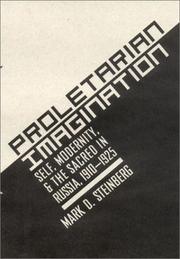
ISBN: 1501717790 9781501717796 080144005X 9780801440052 0801488265 9780801488269 Year: 2018 Publisher: Ithaca, NY : Cornell University Press,
Abstract | Keywords | Export | Availability | Bookmark
 Loading...
Loading...Choose an application
- Reference Manager
- EndNote
- RefWorks (Direct export to RefWorks)
In fin-de-siècle and early revolutionary Russia, a group of self-educated workers produced a large body of poetry and prose in which they attempted to comprehend their rapidly changing world. Witnesses to wars and revolution, these men and women grappled on paper with the nature of civilization and the imperatives of ethical truth. In a strikingly original approach to Russian culture, Mark D. Steinberg listens to their words, which are little known today. The results of their literary creativity, he finds, were frequently not what the new Soviet order was expecting from its workers, despite its celebration of the notion of a proletarian art.Through insightful readings of a vast fund of lower-class writings, Steinberg shows that the authors focused above all on the uncertain nature and place of the self, the promise and dangers of modernity, and the qualities of the sacred in both their lives and their imaginations. Like their counterparts in the intelligentsia, these worker writers were ambivalent about Marxist ideology's celebration of the city and the factory and even about modern progress itself. Drawing on vast research, Steinberg demonstrates the texts' significance for an understanding of Russian popular mentalities, indeed for the very meaning, philosophically and morally, of these years of crisis and possibility at the end of the old order and the early years of the Soviet regime.
Working class --- Working class authors --- Holy, The, in literature. --- Self in literature. --- Working class writings, Russian --- Russian literature --- Commons (Social order) --- Labor and laboring classes --- Laboring class --- Labouring class --- Working classes --- Social classes --- Labor --- Russian working class writings --- Authors, Laboring class --- Authors, Proletarian --- Authors, Working class --- Proletarian authors --- Authors --- Intellectual life. --- History and criticism. --- Employment
Book
Year: 2002 Publisher: Ithaca London : Cornell University Press,
Abstract | Keywords | Export | Availability | Bookmark
 Loading...
Loading...Choose an application
- Reference Manager
- EndNote
- RefWorks (Direct export to RefWorks)
Book
ISBN: 9781350127210 Year: 2021 Publisher: London Bloomsbury Academic
Abstract | Keywords | Export | Availability | Bookmark
 Loading...
Loading...Choose an application
- Reference Manager
- EndNote
- RefWorks (Direct export to RefWorks)
Book
ISBN: 1350127191 1350127221 Year: 2021 Publisher: London : Bloomsbury Publishing,
Abstract | Keywords | Export | Availability | Bookmark
 Loading...
Loading...Choose an application
- Reference Manager
- EndNote
- RefWorks (Direct export to RefWorks)
"Mark D. Steinberg explores the work of individuals he recognizes as utopians during the most dramatic period in Russian and Soviet history. It has long been a cliché to argue that Russian revolutionary movements have been inspired by varieties of 'utopian dreaming' - claims which, although not wrong, are too often used uncritically. For the first time, Russian Utopian digs deeper and asks what utopians meant at the level of ideas, emotions, and lived experience. Despite the fact that many would have resisted the 'utopian' label at the time because of its dismissive meanings, Steinberg's comprehensive approach sees him take in political leaders, intellectuals, writers, and artists (visual, material, and musical), as well as workers, peasants, soldiers, students and others. Ideologically, the figures discussed range from reactionaries to anarchists, nationalists (including non-Russians) to feminists, both religious believers and 'the militant godless'. This innovative text dissects the very notion of the Russian utopian and examines its significance in its various fascinating contexts."--
Utopias. --- Utopias --- Utopias --- Utopias --- Social values --- History. --- European History (History) --- Intellectual History (History) --- Political Ideologies (Politics) --- History. --- Political aspects --- History --- Social aspects. --- Russia --- Soviet Union --- History --- History.
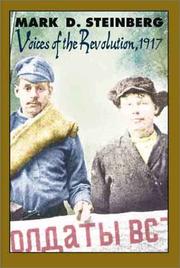
ISBN: 0300090161 Year: 2001 Publisher: New Haven (Conn.) : Yale university press,
Abstract | Keywords | Export | Availability | Bookmark
 Loading...
Loading...Choose an application
- Reference Manager
- EndNote
- RefWorks (Direct export to RefWorks)
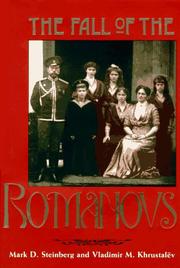
ISBN: 0300065574 Year: 1995 Publisher: New Haven, Conn. Yale University Press
Abstract | Keywords | Export | Availability | Bookmark
 Loading...
Loading...Choose an application
- Reference Manager
- EndNote
- RefWorks (Direct export to RefWorks)
Romanov [House] --- anno 1910-1919 --- Nicholas --- Alexandra, --- Last years --- Sources. --- Russia --- Soviet Union --- History --- Kings and rulers --- Biography --- Nicholas II --- Sources --- Alexandra --- Nicholas II, 1894-1917 --- Revolution, 1917-1921 --- Nicholas - II, - Emperor of Russia, - 1868-1918 - Last years - Sources. --- Alexandra, - Empress, consort of Nicholas II, Emperor of Russia, - 1872-1918 - Last years - Sources. --- Russia - History - Nicholas II, 1894-1917 - Sources. --- Russia - Kings and rulers - Biography - Sources. --- Soviet Union - History - Revolution, 1917-1921 - Sources.
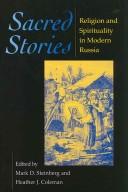
ISBN: 9780253347473 9780253218506 Year: 2007 Publisher: Bloomington Indiana university press
Abstract | Keywords | Export | Availability | Bookmark
 Loading...
Loading...Choose an application
- Reference Manager
- EndNote
- RefWorks (Direct export to RefWorks)
Religion and state --- -248*319.3 --- 281.93 --- State and religion --- State, The --- History. --- Russisch-orthodoxe spiritualiteit --- Orthodoxe Kerk van Rusland --- Religious aspects --- Russia --- -Russia --- -Religion. --- History --- -Religion and state --- Religion. --- 281.93 Orthodoxe Kerk van Rusland --- 248*319.3 Russisch-orthodoxe spiritualiteit --- 248*319.3 --- Russie --- Rossīi︠a︡ --- Rossīĭskai︠a︡ Imperīi︠a︡ --- Russia (Provisional government, 1917) --- Russia (Vremennoe pravitelʹstvo, 1917) --- Russland --- Ṛusastan --- Russia (Tymchasovyĭ uri︠a︡d, 1917) --- Russian Empire --- Rosja --- Russian S.F.S.R. --- Russia (Territory under White armies, 1918-1920) --- Soviet Union --- Russian history --- religion --- history of religion --- history of religiosity --- miraculous icons --- healing --- pilgirm narratives --- confessions --- Orthodox domesticity --- marriage and divorce --- conversion and tolerance --- Jewish folk beliefs --- mysticism --- Russian art --- Orthodox religious thought --- philosophy --- power and resistance --- community and individuality --- the public sphere and public life --- claas and gender --- modernity --- belief --- spirituality --- the sacred --- Russian society --- late Imperial Russia
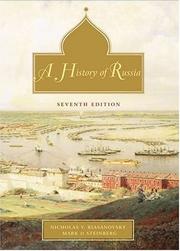
ISBN: 0195153944 9780195153941 Year: 2005 Publisher: New York Oxford university press
Abstract | Keywords | Export | Availability | Bookmark
 Loading...
Loading...Choose an application
- Reference Manager
- EndNote
- RefWorks (Direct export to RefWorks)
Russia (Federation) --- Russia --- Soviet Union --- History. --- History. --- History.
Dissertation
Year: 1990 Publisher: Ann Arbor University microfilms international
Abstract | Keywords | Export | Availability | Bookmark
 Loading...
Loading...Choose an application
- Reference Manager
- EndNote
- RefWorks (Direct export to RefWorks)
| Listing 1 - 10 of 16 | << page >> |
Sort by
|

 Search
Search Feedback
Feedback About UniCat
About UniCat  Help
Help News
News